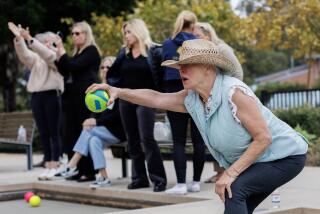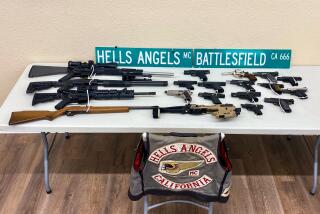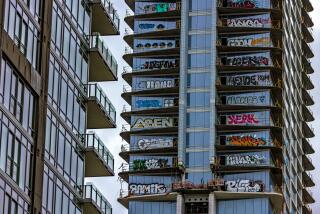9 Years After Seizing Bell Gardens Card Club, U.S. Sells It
- Share via
The federal government announced Thursday that it has sold its controlling interest in the Bicycle Club in Bell Gardens, nine years after seizing control because of money laundering at the card club.
A partnership that operates a successful card club in Oceanside has agreed to purchase the government’s interest for an undisclosed amount and plans to renovate the casino, the second-largest club in the state.
The sale is a huge relief to federal officials. They have been harshly criticized for their operation of the club and have long sought to find a buyer for the government’s interest.
“The government would have loved to get rid of this thing a long time ago,” said Frederick Wyle, the trustee managing the casino for the government.
Wyle declined to disclose the sale price but said the amount would be disclosed in court papers in a few weeks.
The transfer is pending the approval of permits and licenses by state and local officials.
Wyle said federal officials thoroughly investigated the new buyers before agreeing to the sale.
The new buyers, Haig Kelegian, Walter J. Lack and Robert H. Carter, operate the Ocean’s Eleven Casino, a small but thriving card club in Oceanside. Kelegian is also president of the California Gaming Assn.
Kelegian said the new operators plan “major renovations” to help return the club to its former prominence as one of the most profitable casinos in the state.
Bell Gardens Mayor Pro Tem Joaquin Penilla said he is happy that the government has finally found a buyer. “We are hoping for someone to take over the casino to run it better,” he said.
Federal marshals seized the club in 1990 after a jury convicted a casino partner and three other men of racketeering charges stemming from laundering millions of dollars from drug deals through a series of U.S. companies, including the Bicycle Club.
Federal authorities said about $11 million of the laundered money helped finance construction of the $20-million casino in 1984.
The 81,000-square-foot club, located off the Florence Avenue exit of the Long Beach Freeway, offers several versions of poker and popular Chinese card games on 180 tables.
In the year before federal marshals seized the club, it generated $23.4 million in profits and pumped about $10.5 million in taxes to the city’s coffers. Last year, the club generated only $4 million in profits and $7.7 million in city taxes.
An audit by the Justice Department’s inspector general last year called the club’s federal operation “an object lesson” on how not to seize and dispose of criminal property.
Inspector General Michael R. Bromwich said the value of the club declined by about 50% under federal control.
A group of investors in the club also sued the federal government last year, accusing the government of mismanagement. But that suit was recently dismissed by a federal judge.
Last January, the state Fair Political Practices Commission filed a 922-count complaint against the Bicycle Club for attempting to use profits to illegally influence local elections. Federal officials were not charged in the complaint.
Wyle conceded that profits have dropped under the government’s stewardship but he attributes the decline to increased competition from area casinos and to the state’s anti-smoking ban, which took effect last year.
More to Read
Sign up for Essential California
The most important California stories and recommendations in your inbox every morning.
You may occasionally receive promotional content from the Los Angeles Times.













